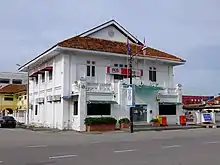Pos Malaysia
Pos Malaysia Berhad (English: Malaysian Post, MYX: 4634) is a postal delivery service in Malaysia, with history dating back to early 1800s.[2]
 | |
| Formerly | Jabatan Perkhidmatan Pos Straits Settlements Post Office |
|---|---|
| Type | Publicly traded state-owned enterprise |
| MYX: 4634 | |
| ISIN | MYL4634OO001 |
| Industry | Postal services, courier |
| Founded | Early 1800s |
| Headquarters | Ibu Pejabat Pos Besar, Kuala Lumpur, Malaysia |
Key people | Charles Brewer (Group Chief Executive Officer) |
| Revenue | RM2.19 billion (2020)[1] |
| Total assets | RM2.71 billion (2020)[1] |
Number of employees | 18,487 (2022) |
| Parent | DRB-HICOM |
| Website | www.pos.com.my |
Services
Pos Malaysia provides postal and related services, namely:
- Standard Mail (Flexipack Domestic, Standard Mail, Non-Standard Mail, Postcards, Mel Rakyat, Pos Ekspres, Pos Daftar, Pos Solutions).
- Courier, Express & Parcels CEP (Same Day Delivery, Next Day Delivery, Time Certain Service, Pos Parcel, Pos Ekspres, Pos Laju Prepaid Pack, On-Demand Pick-up, Prepaid Envelopes/Boxes).
- Retail (Bill payments, driving rketplace).[3]
The company holds an exclusive concession to provide mail services through its network of over 926 branches and mini post offices across Malaysia.[3]
About

History
The history of Pos Malaysia Berhad can be traced back to the early 1800s with the establishment of postal services first in the Straits Settlements in Penang, Malacca and Singapore expanding through the rest of Malaya by the early 20th century. Letters were then conveyed through dispatch riders or special messengers. Instead of postage stamps, fees were collected when letters were handed in at the Post Office. Letters posted were given a receipt.[4]
The system later changed when the Indian stamps overprinted with crown and Straits' stamps overprinted with dollars and cents were introduced in 1867. The first inaugural set of postage stamps was introduced in 1901.
The Federated Malay States Posts and Telegraphs Department was formally created on 1 January 1905 with the merger of the postal and telegraph services of Perak, Selangor, Negri Sembilan, and Pahang.[5]

A Malayan Postage Union was established in 1907 that instituted universal postage rates for the Federated Malay States, the Straits Settlements, and Johor. Kedah, Kelantan, and Trengganu joined in 1909 when they transferred from Thailand to British protection.[5][6]
It also started as a medium for the transmission of letters, newspapers, and business documents. The postal service soon evolved into a multiple services provider. It began to venture into parcel delivery, registrations, insurance service, transaction of money (postal order & money order), and investment of funds (Post Office Saving Bank).
The postal service, then known as Jabatan Perkhidmatan Pos – Postal Services Department (PSD), also began to take over numerous services on behalf of the Government departments. It started to collect payment of electricity bills, sale of dog licences, payment of pensions, sale of television licence and others.
In 1992, Pos Malaysia Berhad was corporated[7] from the PSD. In September 2001, Pos Malaysia Berhad was listed on the then Kuala Lumpur Stock Exchange (now known as Bursa Malaysia Berhad) through a reverse takeover of a Philio Allied Berhad assuming its listing status. Today, Pos Malaysia has many Strategic Business Units - POS Laju, POS, Data Pos, POS ArRahnu, POS Digicert, POS Solutions & POS Online.[8]
Origins and Evolution
Pos Malaysia, the parent company of Pos Laju, has its roots in the early postal services established during the Straits Settlements era in the 1800s. The mail system back then primarily served to facilitate communications between the British colonies. After Malaysia gained independence in 1957, the mail system was nationalized, leading to the establishment of Jabatan Perkhidmatan Pos Malaysia or the Malaysian Postal Services Department.
Formation of Pos Laju
Pos Laju was officially launched in 1985 as the express courier arm of Pos Malaysia, focusing on time-sensitive delivery of documents and parcels. The formation of Pos Laju marked a significant milestone as it heralded a new era in the Malaysian postal and courier industry, with emphasis on speed, reliability, and coverage.
Expansion and Services
Over the years, Pos Laju has significantly expanded its services and network, establishing itself as Malaysia’s leading courier service provider. It offers a diverse range of services including express parcel delivery, logistics, freight forwarding, and e-commerce solutions. The extensive network of Pos Laju encompasses over 1,000 touchpoints, including branches, authorized agents, kiosks, and drop boxes, providing accessibility to customers across Malaysia.
Technological Advancements
Pos Laju[9] has embraced technological advancements to improve its services and operational efficiency. The adoption of advanced tracking technologies enables customers to monitor their parcels in real-time, ensuring transparency and enhancing customer experience. The company also offers various online services, including e-payment options, online tracking, and customer support, catering to the evolving needs of the modern consumer.
Awards and recognition
Pos Laju has received numerous awards and accolades in recognition of its commitment to excellence in courier delivery services. It has been acknowledged for its innovation, service quality, and contributions to the courier and logistics industry in Malaysia.
Commitment to Sustainability
Pos Laju is committed to sustainability and corporate responsibility, implementing eco-friendly practices and contributing to community development initiatives. The company actively participates in environmental conservation efforts, waste management programs, and community engagement activities, reinforcing its dedication to social and environmental stewardship.
Subsidiaries[10]
| No | Name Of Company | Shareholder | Percentage Of Shareholding |
|---|---|---|---|
| 1 | Datapos (M) Sdn Bhd | Pos Malaysia Berhad | 100% |
| 2 | Digicert Sdn Bhd | Pos Malaysia Berhad | 100% |
| 3 | PMB Properties Sdn Bhd | Pos Malaysia Berhad | 100% |
| 4 | Pos Ar-Rahnu Sdn Bhd | Pos Malaysia Berhad | 100% |
| 5 | Pos Laju (M) Sdn Bhd | Pos Malaysia Berhad | 100% |
| 6 | Pos Malaysia & Services Holdings Berhad | Pos Malaysia Berhad | 100% |
| 7 | Pos Takaful Agency Sdn Bhd | Pos Malaysia Berhad | 100% |
| 8 | Prestige Future Sdn Bhd | PSH Capital Partners Sdn Bhd | 100% |
| 9 | PSH Allied Berhad | Pos Malaysia Berhad | 100% |
| 10 | PSH Capital Partners Sdn Bhd | Pos Malaysia Berhad | 100% |
| 11 | PSH Express Sdn Bhd | PSH Venture Capital Sdn Bhd | 100% |
| 12 | PSH Investment Holdings (BVI) Ltd | Pos Malaysia & Services Holdings Berhad | 100% |
| 13 | PSH Properties Sdn Bhd | Pos Malaysia Berhad | 100% |
| 14 | PSH Venture Capital Sdn Bhd | Pos Malaysia Berhad | 100% |
| 15 | Real Riviera Sdn Bhd | PSH Properties Sdn Bhd | 100% |
| 16 | Effivation Sdn Bhd | Pos Malaysia Berhad
PSH Properties Sdn Bhd |
99.99%
0.01% |
| 17 | Pos Aviation Sdn Bhd | Pos Malaysia Berhad | 100% |
Associates[10]
| No. | Name of Company | Shareholder | Percentage of Shareholding |
|---|---|---|---|
| 1 | PosPay Exchange Sdn Bhd | Pos Malaysia Berhad | 50% |
| 2 | CEN Sdn Bhd | Pos Malaysia Berhad | 42.5% |
| 3 | Elpos Print Sdn Bhd | Pos Malaysia Berhad | 40% |
| 4 | CEN Sdn Bhd | FREE | |
| 5 | CEN Technology Sdn Bhd | CEN Sdn Bhd | 50% |
See also
References
- "Annual Reports".
- "Evolusi 200 tahun industri pos di Malaysia". www.astroawani.com.
- "Archived copy" (PDF). Archived from the original (PDF) on 26 June 2017. Retrieved 30 August 2016.
{{cite web}}: CS1 maint: archived copy as title (link) - "Pos Malaysia". www.pos.com.my.
- Report on the Post and Telegraphs Department for the Year 1924,Supplement to the FMS Government Gazette, 26 June 1925. http://commonrepo.um.edu.my/432/1/FMS%20GOV%201925_24.pdf
- "Restaurant POS Systems". Retrieved 2 May 2023.
- "Company Overview of Pos Malaysia Berhad, Prior to Merger with POS Malaysia & Services Holdings Bhd". Bloomberg.com. Retrieved 15 August 2016.
- "Pos Malaysia". www.pos.com.my.
- Amy, Wunderly. "Poslajutracking". Poslajutracking. Amy Wunderly. Retrieved 26 September 2023.
- "Pos Malaysia". www.pos.com.my. Retrieved 30 August 2016.